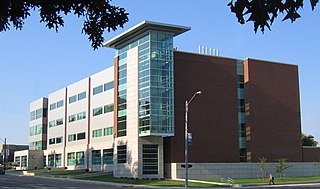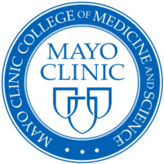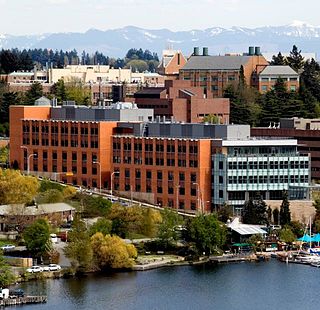
Albert Einstein College of Medicine is a research-intensive medical school located in the Morris Park neighborhood of the Bronx in New York City. Einstein operates as an independent degree-granting institute since 2018, and is part of the integrated health care system, Montefiore Health System, which includes Montefiore Medical Center.

Doctor of Medicine is a medical degree, the meaning of which varies between different jurisdictions. In the United States, and some other countries, the M.D. denotes a professional graduate degree. This generally arose because many in 18th-century medical professions trained in Scotland, which used the M.D. degree nomenclature. In England, however, Bachelor of Medicine, Bachelor of Surgery was used and eventually in the 19th century became the standard in Scotland too. Thus, in the United Kingdom, Ireland and other countries, the M.D. is a research doctorate, higher doctorate, honorary doctorate or applied clinical degree restricted to those who already hold a professional degree (Bachelor's/Master's/Doctoral) in medicine; in those countries, the equivalent professional to the North American and some others use of M.D. is still typically titled Bachelor of Medicine, Bachelor of Surgery (M.B.B.S.).

Baylor College of Medicine (BCM) is a private, independent health sciences center in Houston, Texas within the Texas Medical Center, the world's largest medical center. BCM is composed of four academic components: the School of Medicine, the Graduate School of Biomedical Sciences; the School of Health Professions, and the National School of Tropical Medicine.
A medical school is a tertiary educational institution, or part of such an institution, that teaches medicine, and awards a professional degree for physicians and surgeons. Such medical degrees include the Bachelor of Medicine, Bachelor of Surgery, Master of Medicine, Doctor of Medicine (M.D.), or Doctor of Osteopathic Medicine (D.O.). Many medical schools offer additional degrees, such as a Doctor of Philosophy (Ph.D.), master's degree (M.Sc.) or other post-secondary education.

The University of Tennessee Health Science Center (UTHSC) is a public medical school in Memphis, Tennessee. It includes the Colleges of Health Professions, Dentistry, Graduate Health Sciences, Medicine, Nursing, and Pharmacy. Since 1911, the University of Tennessee Health Science Center has educated nearly 57,000 health care professionals. As of 2010, US News and World Report ranked the College of Pharmacy 17th among American pharmacy schools.
The Virginia–Maryland College of Veterinary Medicine is a state-supported college of two states, Virginia and Maryland, filling the need for veterinary medicine education in both states. Students from both states are considered "in-state" students for admissions purposes.

The Tufts University School of Medicine is one of the ten schools that constitute Tufts University. The Times Higher Education (THE) and the Academic Ranking of World Universities (ARWU) consistently rank Tufts among the world's best medical research institutions for clinical medicine. Located on the university's health sciences campus in downtown Boston, Massachusetts, the medical school has clinical affiliations with thousands of doctors and researchers in the United States and around the world, as well as at its affiliated hospitals in both Massachusetts, and Maine. According to Thomson Reuters' Science Watch, Tufts University School of Medicine's research impact rates sixth among U.S medical schools for its overall medical research and within the top 5 for specialized research areas such as chronic obstructive pulmonary disorder, urology, cholera, public health & health care science, and pediatrics.

UConn Health is the branch of the University of Connecticut that oversees clinical care, advanced biomedical research, and academic education in medicine. The main branch is located in Farmington, Connecticut, in the US. It includes a teaching hospital, the UConn School of Medicine, School of Dental Medicine, and Graduate School. Other smaller branches exist in Storrs and Canton. The university owns and operates many smaller clinics around the state that contain UConn Medical Group, UConn Health Partners, University Dentists and research facilities. Andrew Agwunobi stepped down as the CEO of UConn Health in February 2022 after serving since 2014 for a private-sector job. Bruce Liang is UConn Heath's interim CEO and remains dean of the UConn School of Medicine.
The Medical Scientist Training Programs (MSTPs) are dual-degree training programs that streamline the education towards both clinical and research doctoral degrees. MSTPs are offered by some United States medical schools, who are awarded financial support from the National Institute of General Medical Sciences (NIGMS), a branch of the National Institutes of Health (NIH). The goal of these training programs is to produce physician scientists who can translate laboratory discoveries into effective treatments for patients.
The Doctorate of Medicine and of Philosophy (MD–PhD) is a dual doctoral degree for physician–scientists, combining the professional training of the Doctor of Medicine degree with the research expertise of the Doctor of Philosophy degree; the Ph.D is the most advanced credential in the United States. Other dual degree programs exist, such as the joint MD-JD degree; both the JD professional degree and the MD are not universally recognized internationally, however. The National Institutes of Health currently provides 50 medical schools with Medical Scientist Training Program grants that support the training of students in MD–PhD programs at these institutions through tuition and stipend allowances. These programs are often competitive, with some admitting as few as two students per academic year. The MCAT score and GPA of MD–PhD matriculants are often higher than MD only matriculants.

The University of Minnesota Medical School is the medical school of the University of Minnesota. It is a combination of two campuses situated in Minneapolis and Duluth, Minnesota. The University of Minnesota Medical School is also part of one of the largest Academic Health Centers (AHC) in the United States. This center allows health professionals to train collaboratively across interdisciplinary teams throughout the course of their training programs. The AHC comprises the Medical School, School of Dentistry, School of Nursing, College of Pharmacy, School of Public Health, and the College of Veterinary Medicine.

The Mayo Clinic College of Medicine and Science (MCCMS), formerly known as Mayo Clinic College of Medicine (MCCM), is a private graduate-only research university based in Rochester, Minnesota that trains physicians, scientists, and allied health professionals. The college is part of the Mayo Clinic academic medical center and is accredited by the Higher Learning Commission (HLC). MCCMS consists of five schools that offer M.D., Ph.D., and other degrees, as well as medical residencies, fellowships, and continuing medical education (CME).
Wake Forest School of Medicine is the medical school of Wake Forest University, with two campuses located in Winston-Salem, North Carolina and Charlotte, North Carolina, United States. It is affiliated with Atrium Health Wake Forest Baptist, the academic medical center whose clinical arm is Atrium Health Wake Forest Baptist. In 2021, U.S. News & World Report ranked Wake Forest School of Medicine 48th best for research in the nation and 80th best for primary care. The School of Medicine also ranks in the top third of U.S. medical schools in funding from the National Institutes of Health (NIH).

The University of Health Sciences is a public university offering degrees in health sciences in Phnom Penh, Cambodia.

The Texas Tech University Health Sciences Center School of Medicine is the medical school of Texas Tech University Health Sciences Center (TTUHSC). TTUHSC SOM was originally chartered in 1969 to train more physicians for the underserved populations of the West Texas region. As of 2011, the School of Medicine has awarded over 4,000 Doctor of Medicine degrees. The school offers the traditional four-year curriculum, as well as an accelerated three-year track, and joint degree programs with Texas Tech University.

The University of Washington Department of Bioengineering is a joint department of the College of Engineering and School of Medicine, and is located in Seattle, Washington, USA.
The Case Western Reserve University Department of Biomedical Engineering launched in 1968 as one of the first Biomedical Engineering programs in the world. Formally incorporated in both the School of Engineering and School of Medicine, the department provides full research and education programs and is consistently top-ranked for graduate and undergraduate studies, according to U.S. News & World Report.

The Mayo Clinic Alix School of Medicine (MCASOM), formerly known as Mayo Medical School (MMS), is a research-oriented medical school based in Rochester, Minnesota, with additional campuses in Arizona and Florida. MCASOM is a school within the Mayo Clinic College of Medicine and Science (MCCMS), the education division of the Mayo Clinic. It grants the Doctor of Medicine (M.D.) degree, accredited by the Higher Learning Commission (HLC) and the Liaison Committee on Medical Education (LCME). In November 2018, the school was renamed in honor of a $200 million donation from businessman Jay Alix.

A teaching hospital is a hospital or medical centre that provides medical education and training to future and current health professionals. Teaching hospitals are almost always affiliated with one or more universities and are often co-located with medical schools.
The National Institutes of Health (NIH) Oxford Cambridge (OxCam) Scholars Program, founded in 2001, is an accelerated doctoral program in which scholars engage in collaborate biomedical research at the NIH and either the University of Oxford or the University of Cambridge. The program offers both PhD and combined MD/PhD training pathways through collaborations with various medical schools in the United States. Since the program's founding, over 200 students have completed their doctoral training through the program.




















